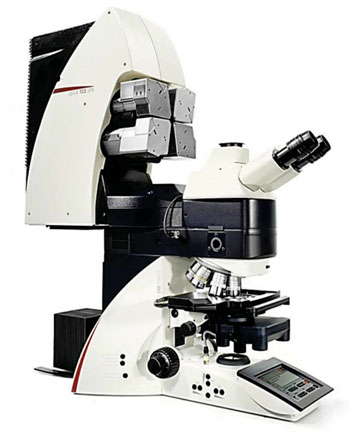Molecular Studies of Suppressor Gene Advance Understanding of Metastasis
By LabMedica International staff writers
Posted on 17 Jan 2016
A gene that is known to suppress the growth and spread of many types of cancer has the opposite effect in some forms of colorectal cancer and these findings may lay the foundation for new colorectal cancer treatments.Posted on 17 Jan 2016
Cancer deaths attributed to colorectal cancer are mainly due to tumor recurrence and metastasis to other organs and excluding skin cancers, colorectal cancer is the third most common cancer diagnosed in both men and women in the USA. It is estimated that the lifetime risk of developing colorectal cancer is about 1 in 20.

Image: The Leica TCS SP8 confocal laser scanning microscope (Photo courtesy of Leica Microsystems Inc.).
Scientists at the University of Missouri (Columbia, MO, USA) used cancer cell models, mouse models and human biopsy samples and by using different molecular methods, the team found that the Sprouty2 (SPRY2) gene functions differently in colorectal cancer (CRC) than in other types of cancers. Sprouty (SPRY) is an intracellular regulator of receptor tyrosine kinase signaling involved in growth, differentiation and tumorigenesis. Four family members of SPRY (SPRY1–4) have been identified. SPRY2 appears to be ubiquitously expressed, whereas other family members show organ and tissue specificity.
Among the various techniques used, 3′UTR reporter assays were performed and the luminescence was measured by a luminometer (Turner Biosystems Inc.; Sunnyvale, CA, USA) confocal microscopy using a Leica TCS SP8 confocal laser scanning microscope (Leica Microsystems Inc.; Buffalo Grove, IL, USA) was performed; and formalin-fixed, paraffin-embedded human colorectal cancer (CRC) tissue microarray (Biomax; Rockville, MD, USA) was utilized for V-Akt Murine Thymoma Viral Oncogene Homolog 2(AKT2) and E-cadherin (CDH1) immunostaining.
The team found that in colorectal cancer, SPRY2 may increase the metastatic ability of cancer cells instead of suppress it. SPRY1 and SPRY2 messenger ribonucleic acid (mRNA) transcripts were significantly upregulated in human CRC. Suppression of SPRY2 repressed AKT2 and epithelial-mesenchymal transition inducing transcription factors and significantly increased E-cadherin expression. Concurrent downregulation of SPRY1 and SPRY2 also increased E-cadherin and suppressed mesenchymal markers in colon cancer cells. By confocal microscopy, they demonstrated redistribution of E-cadherin to plasma membrane in colon cancer cells transfected with miR-194.
Sharad Khare, PhD, an associate professor and senior author of the study said, “The gene known as Sprouty2 has previously been shown to protect against metastasis, or the spreading of cancer to other parts of the body, in breast, prostate and liver cancer. However, our recent molecular studies found that this gene may actually help promote metastasis instead of suppress it. This finding is a very significant step in our understanding of metastasis in colorectal cancer, but it's important to note that we believe this phenomenon may occur in only a subset of colorectal cancer patients.” The study was published originally in advance of print, online on October 5, 2015, in the journal Oncogene.
Related Links:
University of Missouri
Turner Biosystems Inc.
Leica Microsystems Inc.













